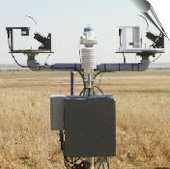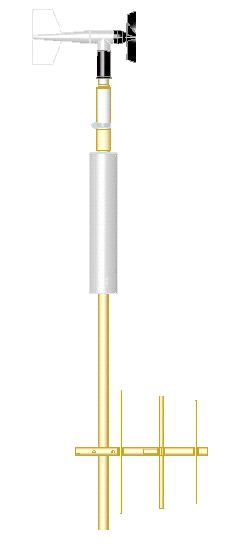 |
TMS-7200 Total Meterological Sensor The TMS-7200 Total Meteorological Sensor is a rapid setup emergency response remote surface weather monitoring sensor for HAZMAT, wildland fire fighting and homeland security/homeland defense applications. It is well-suited for real-time plume dispersion model support, where mobility and high reliability are critical. Used with a METHUB Metropolitan Data Receiver and METDAS software, clusters of TMS-7200 sensors for a wide area environmental monitoring system to drive Hazard Prediction and Assessment (HPAC) transport and dispersion plume models.Each TMS-7200 contains a GPS engine, pressure, temperature, relative humidity and wind speed and direction sensors. One minute average data are transmitted to a central METHUB data receiver. Nuclear radiation detectors are also available for radiological attack emergency response. In rural areas with line of sight, a 5 to 7 mile radius can be covered; in urban areas a 2 to 3 mile radius can be covered. Links: |
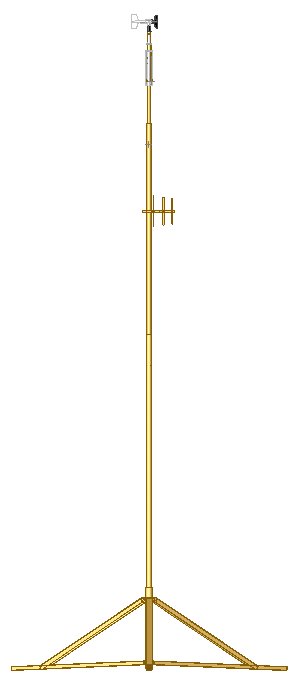 |
WEB-8700 Weather Web Remote Observation System The Weather Web™ Remote Observation System software framework provides rapid emergency response teams with real time meteorological parameters from multiple, spatially-separated locations. It can be rapidly deployed and provides a robust and fully automated system for continuous unattended observations across a metropolitan area.The core component of a Weather Web is METDAS software that provides real-time display and data feed to HPAC Transport and Dispersion plume models. METDAS provides decision makers with life-saving information about the direction of chem-bio plumes or fire line progress, driven in real time by wind data. Based on TCP/IP networking, it is compatible with industry standards and is readily integrated with existing and emerging command and control systems, such as web emergency operations centers.Weather web data supplants the range of human observations by automating tasks that are not well suited to humans. Wind data is displayed in real-time, permitting personnel to perform more value-added tasks, and eliminates subjectivity from human observers. In high stress situations (e.g. NBC attacks), personnel can evacuate affected areas to safer ground.Multiple sensor types can be added to clusters of TMS-7200 Total Meteorological Sensors such as Total Sky Imagers for cloud movement at the boundary layer and Automated Radiosonde Launchers for upper air wind data. Links: |
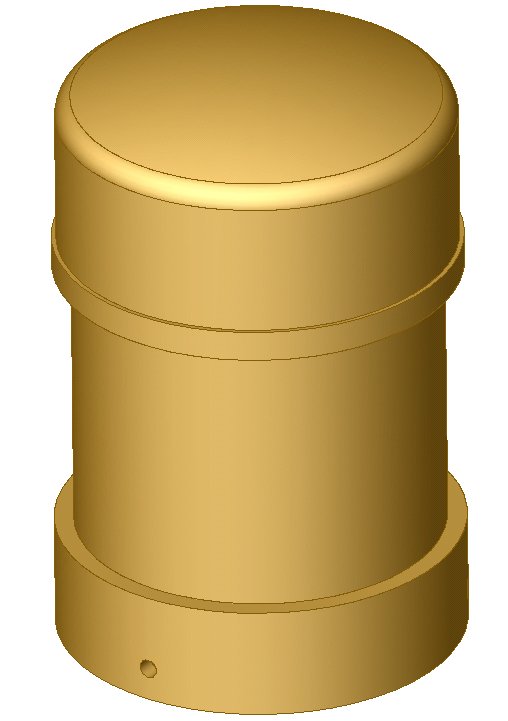 |
RAD-7001 Nuclear Radiation Detector The RAD-7001 Nuclear Radiation Detector provides radiological event detection to a met station such as the TMS-7200. It adds the capability of continuously monitoring ionizing radiation events over a geographically distributed metropolitan-sized area. RAD-7001 one minute average accumulated counts are displayed on METDAS real-time display software. For homeland security applications that require continuous real-time data to drive downstream emergency response decision tools, the RAD-7001 provides a turnkey solution for HAZMAT teams and can work without AC power or the telephone network. Links: |
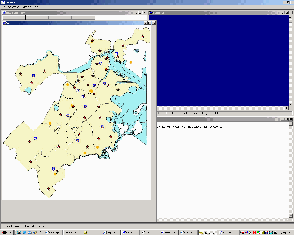 |
METDAS Real Time Data Display Software METDAS Real Time Display Software is a core component of the Weather Web 8700 system. It displays and stores data streamed to it via a METHUB Metropolitan Area Data Receiver, arriving from geographically distributed wireless TMS-7200 meteorological sensors. For homeland security applications requiring continuous real time wind data to drive Hazard and Prediction Capability (HPAC) plume dispersion models, METDAS provides an automatic means of ingesting and distributing this data. Using model output, HAZMAT teams can use METDAS to help them make accurate evacuation decisions during emergencies. Links: |
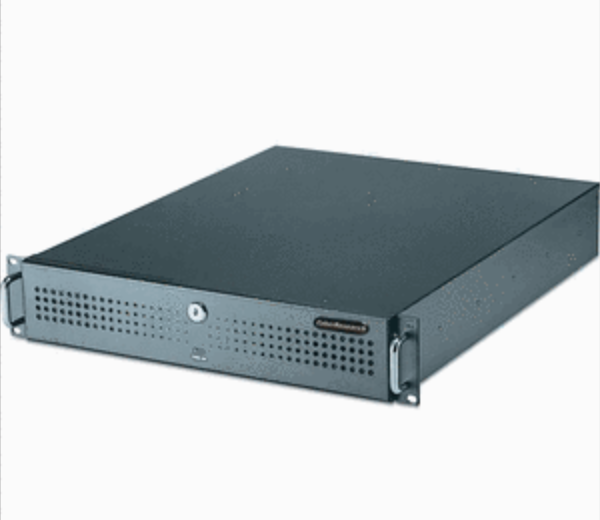 |
METHUB MET Data Receiver The METHUB Met Data Receiver is a digital data receiver hub for geographically distributed, wireless weather stations such as the TMS-7200. For homeland security applications that need to drive Hazard and Prediction Capability (HPAC) plume dispersion models, the METHUB automatically collects and distributes data. HAZMAT teams can rapidly deploy a metropolitan-area environmental monitoring system using the METHUB at the core. Links: |
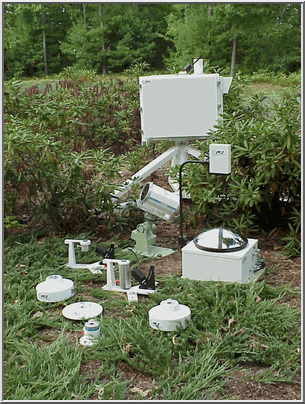 |
TRP-1000 Total Radiation Package The Total Radiation Package is a sophisticated measurement platform that combines a high-performance sky imager, 1024-pixel CCD spectrograph, and optional LIDAR and standard met sensors to provide a fully automatic "state-of-sky". In addition to color digital imagery, it provides automatic optical depth information via a direct, diffuse, and total rotating shadowband spectrograph covering the visible/near-infrared spectral range. It complements airport automated surface observation systems without overlapping existing capabilities. Links: |
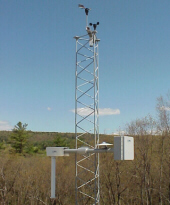 |
TMS-7000 Total Meterological System The Total Meteorological System (TMS) is a state-of-the-art remote weather monitoring system based on a suite of "best-of-breed" field-proven environmental sensors. Each TMS main assembly system includes a MET-2010 Thermohygrometer with integral pressure sensor (temperature, dew point, and pressure), aTSP-400 visible/NIR pyranometer (solar), and 2-D wind speed and direction (sonic or wind vane/anemometer). Optional sensors include TSI-880 Automated Total Sky Imagers, UVB-1 or UVA-1 UV pyranometers, TIR-550 IR radiometers , optical visibility and precipitation sensors, laser ceilometers and tipping bucket rain gauges. And for research or air quality applications, TSP-700 Total Solar Pyranometers , MFR-7 Shadowband Radiometers, and RSS-1024 CCD spectrographs can also be added. Links: |
|
|
Atmospheric Radiation Monitoring System The UV/Visible/NIR Atmospheric Radiation Monitoring System(ARMS) consists of the YES MFR-7, UVMFR-7 , and UVB-1pyranometer. This system forms the backbone of the USDA's "UVB Radiation Monitoring Program" run by scientists at Colorado State University (CSU) in Fort Collins, CO. Together these instruments measure direct, diffuse and total spectral irradiance from 300 to 940 nm, as well as broadband UVB and visible irradiance. The network has been providing UV data from nearly 40 sites around North America to the research community for the past seven years. In addition to publishing the data on the web, the group of scientists at CSU who run the network have developed algorithms to extract certain data such as ozone retrievals and have published numerous papers. The ARMS can optionally be configured with auxiliary sensors such as the TSP-700 pyranometer and/or the TIR-550 IR radiometer to extend global measurements to the Near-IR and IR. Links: |
To view frequently asked questions about our surface weather products, click here.

